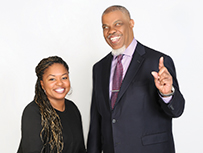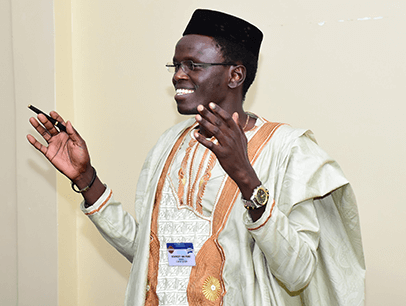
A relationship between a mentor and a mentee offers a clear win-win situation. But what about the duo’s Toastmasters club? The benefits of mentorship can create a win-win-win situation for all parties involved. It’s a win for the mentee, who gains support and guidance; a win for the mentor, who gains experience communicating and connecting with new people; and a win for the club when a personal connection increases member satisfaction, engagement, and retention.
“Having a personal relationship is very valuable, especially during pandemic lockdowns,” says Srianthie Salgado, DTM, of Lyceum Toastmasters Club Nugegoda in Sri Lanka. Salgado is mentoring eight members in her club. “Toastmasters meetings helped us stay connected, and even learn new things together. Those of us who were more tech savvy could personally guide others in learning how to navigate online meetings. Mentoring isn’t just checking on progress,” she says. “It’s more the personal touch.”
So, what is the mentoring program in Toastmasters? It’s an organized way of pairing a new member with an experienced member to ensure individual goals and development are being achieved. New members are onboarded quickly, with mentors guiding them through club meeting roles and member responsibilities. When both mentors and mentees see growth and strengthened personal connections, members say they are more likely to continue their club participation.
Read on to discover the benefits of a mentor program for your club, and how to start one.
Mentorship Benefits for All
Aside from the benefits gained by the mentor and mentee, there are significant advantages to organizations. Almost 70% of Fortune 500 companies have mentoring programs to help meet organizational and employee needs. Mentoring has even been found to reduce turnover.
In a case study at Sun Microsystems, retention rates were significantly higher for mentees (72%) and mentors (69%) than for employees who did not participate in a mentor program (49%). Studies also have found that employees who have a mentor are more satisfied with their jobs, and when it comes to inclusion, according to a Cornell University study, a formal mentoring program can be especially beneficial for racial and gender minority employees. They discovered mentoring programs increased minority representation at the management level and improved promotion and retention rates.
And it’s not just employees in the workplace who find benefits from mentorship relationships—Toastmasters do too. Salgado says, “Mentoring is a way to encourage leadership skills. A mentor can encourage a member to try meeting leadership roles, club leadership roles, and leadership roles beyond the club as well.”
She also points out how mentors can help new members build confidence—from meeting roles to navigating Pathways, and in some clubs, confidence in speaking English. “When your club has members who are not native English speakers, that adds another level of nervousness. Having a mentor helps them build their confidence and feel more comfortable within the group.”
A mentoring program also can be a plus in club recruitment, converting guests to members, Salgado says. “At the end of the meeting, we preview what [guests] can expect once they join. We let them know that they’ll be assigned a mentor to guide them.”
How to Begin a Mentoring Program
Once your club is ready to get started, look to the Club Mentor Program, part of The Successful Club Series. This includes the Mentor Interest Survey, a one-page guide on managing the program, and more.
You can modify the program to meet your club’s needs. For example, the survey recommends giving the completed form to the Vice President Education (VPE). However, for many clubs, the VPE needs to focus on scheduling speakers, so the Vice President Membership (VPM) may be a better choice to monitor the program.
“The VPM converts visitors to members, officially helping them go through the membership application,” says Marty Dickinson of Professional Presenters Toastmasters in Denver, Colorado. In his club, the VPM is the perfect officer to take on the responsibility of the mentor program.
And, if you want to call your mentoring program by another name, you can. Dickinson, who has mentored more than 100 members since 1990, belongs to a club whose members are mostly experienced Toastmasters or seasoned professional speakers. Some of the members didn’t like the term “mentor” so they changed it to “onboarding partner.”
When both mentors and mentees see growth and strengthened personal connections, members say they are more likely to continue their club participation.
Your club can even create its own unique mentoring checklist. A checklist gives guidance to the mentors and helps ensure that the basics are consistently covered for new members, such as assisting with speech practice and explaining meeting roles. “We have a checklist of the important information,” says Tricia Phipps, VPM of Engaging Humour Toastmasters Club in Langley, British Columbia, Canada. “Mentors help guide mentees through accepting roles at meetings. All new members get a mentor that sticks with them until Pathways Level 1 is done. After that, it’s up to the mentor and mentee to decide how much training and time is needed.” Each mentoring relationship will be different.
“You should treat every mentee the same, which means that you treat them all differently. Every mentee needs to have the mentoring that they need,” says Accredited Speaker Clare Crowther, DTM, of Armada Speakers in Plymouth, England. Crowther created a mentoring program for her club as her Distinguished Toastmaster project. “The key is to listen, listen, listen. Be willing to help your mentee in the way they need to be helped. At the same time, a mentee needs to respect the mentor’s time. Mutual respect is important.”
Your club may want to approach the Club Mentor Program as a pilot project. “Pilot it with six or so mentors until such time that tangible results can be shared,” says Sravanthi Vallampati, DTM, of Diversity 4 Success Toastmasters in Aurora, Ohio. Vallampati, who has mentored more than 30 Toastmasters, is currently piloting two group mentoring programs, one to provide support in achieving the DTM and another for Pathways support.
While there is a Pathways Mentor Program, it is entirely different program, and not a requirement for being a club mentor. All that is required to be a mentor in the Club Mentor Program is a desire to help another member improve their skills.
Matching Mentors and Mentees
In the Club Mentor Program, members are paired based on the Mentor Interest Survey, which identifies interest in mentoring or being mentored, at what level of experience, and if there’s a specific focus.
“We connect people based on personality type and goals but encourage people to ask any member for help if needed,” says Phipps.
As with the rest of the program, the way mentors and mentees are matched can be modified for your club. For example, even if the VPE monitors the program, the VPM can provide input to help assign appropriate mentors. Other clubs might give the mentee a choice in who will mentor them.
“When a mentor genuinely cares and the mentee works hard to lean in, learn, and grow, we have success,” says Vallampati.
No matter which method is used to match mentees and mentors, relationships created through a Club Mentor Program can be a win for the mentee, a win for the mentor, and a big win for the club. 
Diane Windingland, DTM is a presentation coach from Spring, Texas, and a member of three clubs: Frankly Speaking Toastmasters in Spring, Texas, and PowerTalk Toastmasters and Readership Toastmasters, both in Minnesota. Learn more at virtualspeechcoach.com.
Related Articles

Mentorship
The Meaning of Good Mentoring

Mentorship
Mentorship in Toastmasters and Medicine

Meet My Mentor



 Previous
Previous

 What Makes a Good Mentor?
What Makes a Good Mentor?
 Previous Article
Previous Article